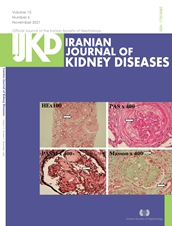Analysis of the Efficacy and Safety of Teriparatide and Alendronate in the Treatment of Osteoporosis After Renal Transplantation
Abstract
Introduction. Both teriparatide and alendronate were used in the treatment of osteoporosis after renal transplantation. However, there are few studies comparing their application after renal transplant surgeries. This study was carried out to compare the effect of alendronate and teriparatide on bone mineral density in the treatment of osteoporosis after renal transplantation. Methods. This is a retrospective cohort study of 153 patients who were diagnosed with osteoporosis after receiving renal transplantation, and received either alendronate or teriparatide treatment. The demographic patient information, changes in patients’ quality of life, mobility and pain scores, serum biochemical markers and bone density of lumbar spine, hip and femoral neck were measured and compared between groups a year after treatment. Results. there were no significant differences between the two groups concerning patient demographics such as age, gender and BMI. After a year of treatment, there were no significant differences between the two groups in biochemical markers such as serum calcium, phosphorus, creatinine and 25-OH Vitamin D (P > .05). BMD of lumbar spine, hip and femoral neck after the treatment was significantly higher in the teriparatide group than alendronate group (P < .05), while the incidence of adverse effects was higher in the teriparatide group than alendronate group (P < .05). Conclusion. teriparatide can be more effective than the alendronate in the treatment of osteoporosis in renal transplant patients, while having more adverse effects.
DOI: 10.52547/ijkd.6475
Downloads
Download data is not yet available.
Downloads
Published
2021-12-20
Issue
Section
ORIGINAL | Transplantation
How to Cite
Analysis of the Efficacy and Safety of Teriparatide and Alendronate in the Treatment of Osteoporosis After Renal Transplantation. (2021). Iranian Journal of Kidney Diseases, 15(6), 451-456. https://ijkd.org/index.php/ijkd/article/view/6475


